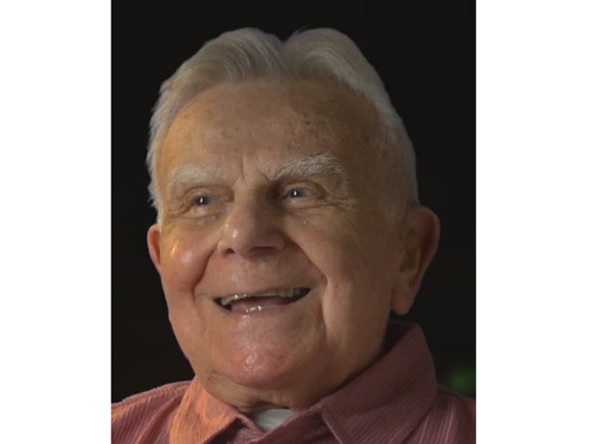 John E Dolibois;
John E Dolibois;
On Monday 8 October 2018, the 50th Anniversary of the Miami University Dolibois European Center (MUDEC) being held this week included a cinema outing to see "Ashcan" at the Ciné Utopia in Luxembourg-Limpertsberg.
Over 700 alumni have travelled over to Luxembourg from the US for this celebration which will culminate with an academic session on Wednesday evening at the Hotel Parc Alvisse in Luxembourg-Dommeldange. On Monday evening, though, over 200 people attend the "Ashcan" screening in the presence of film director Willy Perelsztejn.
Andy Adams, Secretary General of the MUDEC Alumni Luxembourg chapter, welcomed the audience in both Luxembourgish and English and explained that around 12,000 Americans have studied in Luxembourg at the Miami University located in the chateau at Differdange. He stressed, however, that the collaboration is two-way, with many Luxembourg nationals studying at Miami University in Oxford, Ohio. He also mentioned that he has accompanied many groups of 10 students to Oxford, Ohio, to visit the university and which used to include a visit to Jean Delebois' home for a BBQ.
John Dolibois, after whom MUDEC has been named since 1988, was born in Luxembourg and served as US Ambassador to Luxembourg from 1981-1985. He was one of the five Nazi interregators at "Ashcan", a secret prison which operated out of the former Palace Hotel in Mondorf-les-Bains from May 1945 to August 1945, between when WWII ended and the Nurenberg trials started.
Director Willy Perelsztejn explained that the Film Fund Luxembourg provided most of the funding for the film, the idea of which was brought to him by the CNA. He revealed that he pored over 1,000 pages of documents, including 55 military reports of the Ashcan interrogations which were used at the Nurenberg trials and which now reside in an archive in the US.
He also explained that he wanted to create a film that was inbetween fiction and a documentary. He decided to write a play for which he enlisted Anne Simon to direct - this play was performed in Luxembourg and in Heidelberg. His cameras tracked the development of the production which showed how the characters of the interrogators and the Nazi prisoners were portrayed. The film was tellingly in three languages - German, French and English, subtitled in English.
Top Nazi leaders such as Hermann Göring, Karl Dönitz, Wilhelm Keitel, Alfred Rosenberg, Robert Ley, Hans Frank, Julius Streicher, Arthur Seyss-Inquart, Lutz von Krosigk, Franz von Papen and others were detained and interrogated as Ashcan in Mondorf. The prison was a top secret and even the villagers did not know what was happening, or who was detained, at the Palce hotel which had been surrounded by a cordon of barbed wire.
The film immerses the audience in the heart of US military intelligence. Foregoing any use of force or torture, a handful of young American officers obtained extraordinary information about the conquered regime from some of the worst criminals against humanity. One of those officers was a native Luxembourger who had emigrated to the US in the 1930s, John Dolibois, and the film contains exclusive interviews with him.
The film documents an extraordinary time for not just Luxembourg, but Europe, in the immediate aftermatch of WWII. It is expected to be screened at Ciné Utopia through next week, and then is also expected to be screened on television in a number of neighbouring countries.








